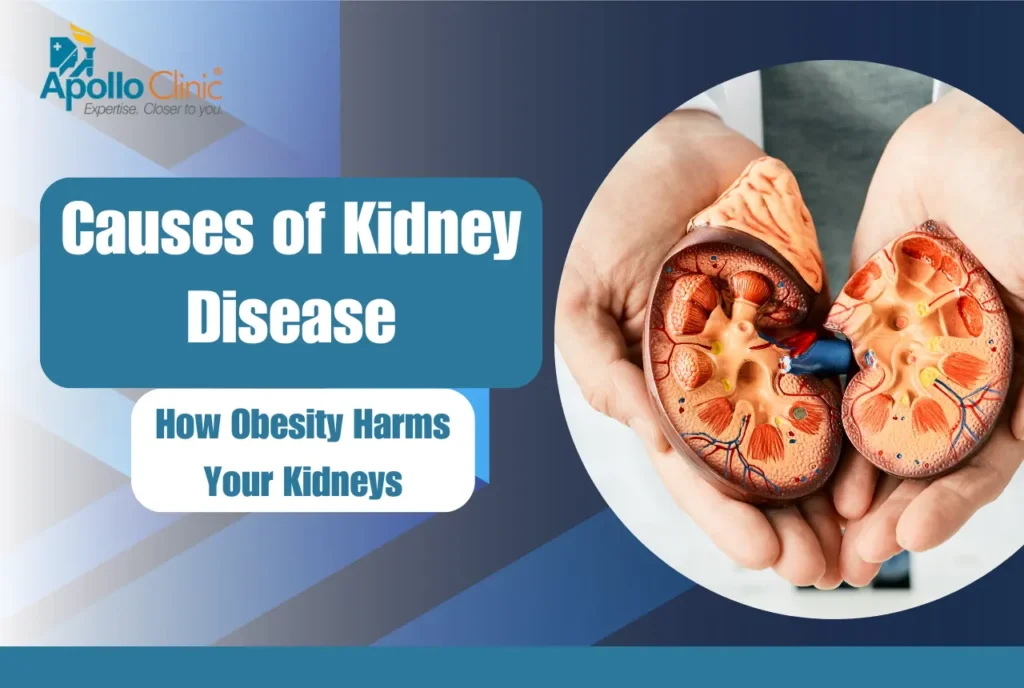Causes of Kidney Disease: How Obesity Harms Your Kidneys
Excretion is an essential process of life aided by our kidneys, lungs, and liver. The human body has two kidneys the size of a fist. Their health depends largely on our lifestyle and our eating habits. Research shows that most of the causes of kidney disease have roots in our eating and lifestyle. Therefore, in this article, we will discuss some of the major causes of chronic kidney diseases and how obesity makes them worse.
Chronic kidney disease, commonly known as chronic kidney failure, causes a gradual loss of kidney function. Your kidneys filter waste and surplus fluids from your blood, which are then excreted in your urine. Advanced chronic renal disease can cause harmful levels of fluid, electrolytes, and waste to accumulate in your body.
In the early stages of chronic kidney disease, you may experience minimal signs or symptoms. You may not be aware that you have kidney disease until it is late.
Also Read: 5 Causes of Tonsil Pain in Children & Effective Remedies
Causes of Kidney Disease: Understanding the Threat

A chronic kidney condition is characterized as having a renal anomaly, or “marker,” such as protein in the urine, and having impaired kidney function for at least three months. There are numerous reasons for chronic renal disease. Diabetes and high blood pressure can both have an impact on kidney function.
The following are some of the most frequent forms and causes of kidney injury.
- Diabetes is a condition in which your body either does not produce enough insulin or is unable to use normal insulin levels correctly. This results in a high blood sugar level, which can cause difficulties throughout your body. Diabetes is the number one cause of renal disease.
- High blood pressure (hypertension) is another prominent cause of kidney disease and its consequences, including heart attacks and strokes. High blood pressure develops when the force of blood against the arterial walls increases. Controlling high blood pressure reduces the risk of consequences like chronic renal disease.
- Glomerulonephritis is a disease that causes inflammation of the kidney’s microscopic filtering units, known as glomeruli. Glomerulonephritis can develop unexpectedly, such as after strep throat, and the person may recover.
- Interstitial nephritis is an inflammation of the renal tubules and associated tissues. Prolonged occlusion of the urinary system is caused by disorders such as enlarged prostate, kidney stones, and some malignancies.
Also Read: Learn How to Beat Summer Heat with These 5 Amazing Tips
How Obesity Harms Your Kidneys: 5 Key Indications

1. Increased Strain and Hyperfiltration
Obesity is characterized by increased strain and mass on the body which also increases strain on our internal organs. Therefore, an obese person with diabetes, high blood pressure, or other lifestyle diseases will have a lot more strain on his or her kidneys.
Another factor that causes kidney damage is hyperfiltration. It is a condition when our kidneys have to filter a lot more blood than normal. This wears out their mechanism. Hyperfiltration is a condition that obese people suffer from.
2. High Blood Pressure and Kidney Damage
High blood pressure in obese people causes blood vessels to tighten and narrow, eventually damaging and weakening them throughout the body, including the kidneys. The constriction restricts blood flow.
If your kidneys’ blood arteries get damaged, they may no longer function effectively. When this occurs, the kidneys are unable to eliminate all waste and excess fluid from your body. Extra fluid in your blood vessels can elevate your blood pressure even higher, resulting in a deadly loop and more damage that leads to kidney failure.
3. Insulin Resistance and Inflammation
Insulin resistance contributes to the metabolic syndrome, which is linked to the development of kidney disease. However, it is uncertain whether insulin resistance alone increases the risk of chronic kidney disease (CKD) development or CKD complications. Furthermore, the predisposing factors for insulin resistance in CKD in the absence of diabetes are not well understood.
4. Increased Risk of Kidney Stones
Stones may run in your family, so you may be predisposed to developing them. You do not influence that specific risk factor. Obesity, however, is another major risk factor for kidney stones.
In reality, stone formers have a far higher body mass index (BMI) than non-stone formers. Furthermore, obese women and men are more likely to have co-morbidities such as type 2 diabetes and hypertension. Both of these disorders are connected with an increased risk of kidney stones.
Kidney stones occur when you consume too many foods heavy in sodium, trans fats, additives, and low-quality proteins. Processed foods, junk food, and meats containing nitrates and nitrites all create inflammation in the body, which can lead to rapid weight gain.
5. Abnormal Levels of Blood Fats
High cholesterol is most commonly related to heart problems: when too much cholesterol accumulates in your heart veins, it raises your risk of having a heart attack (also known as coronary heart disease) or a stroke. However, this buildup of fatty deposits does not only harm the heart; it can also have an impact on blood circulation to other regions of the body, such as the kidneys.
Too much cholesterol might accumulate in the blood arteries supplying your kidneys. This significantly impairs the kidneys’ ability to function normally.
Compared to other organs and tissues, the kidneys have an especially rich blood supply; despite their modest size, the kidneys get around 20% of the heart’s blood flow for filtration. This filtration balances the body’s fluids, removing waste and retaining essential nutrients.
Also Read: Benefits of Curcumin for Gut Health: Top 5 Benefits of Curcumin
Kidney Disease Symptoms

The different chronic kidney disease stages have different symptoms. A variety of symptoms may occur if it is not detected early or worsens despite treatment.
Symptoms may include:
- Weight loss and decreased appetite
- inflammation of ankles, feet, or hands due to water retention (edema).
- Symptoms include shortness of breath and weariness.
- Blood in your urine
- Symptoms may include an increased need to pee, especially at night, and difficulties urinating. Sleeping (Insomnia)
- Symptoms may include itching skin and muscle cramping.
- Symptoms include feeling unwell and headaches.
- Erectile dysfunction in men.
This stage of CKD is referred to as kidney failure, end-stage renal disease, or established renal failure.
Also Read: What are the Benefits of Brushing Twice?
Bottomline
Kidney damage is becoming more and more common because our eating habits and lifestyle have gotten unhealthier. The main causes of kidney disease are our daily activities and the way we live. We party hard every weekend consuming litres of alcoholic beverages that affect our liver and kidneys.
So, as we have always said and believed, precaution is better than cure. Before you have to opt for kidney disease treatment, try improving your lifestyle and eating right. For more details on treatments and tests, come for a consultation at Apollo Clinic Silchar. Book your consultation today!


